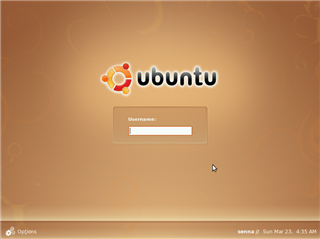At the LinuxWorld expo in San Francisco, analyst Jay Lyman of the 451 Group spoke about the potential for enterprise adoption of Ubuntu and the impact that community-driven Linux distributions will have on the market.
Companies are increasingly choosing free community-driven Linux distributions instead of commercial offerings with conventional support options. Several factors are driving this trend, particularly dissatisfaction with the cost of support services from the major distributors. Companies that use and deploy Linux internally increasingly have enough in-house expertise to handle all of their technical needs and no longer have to rely on Red Hat or Novell, according to Lyman.
Procurement practices are evolving overseas, especially in Europe, where distributions like CentOS and Ubuntu are gaining more traction in corporate environments and data centers.
"In Europe there is a greater propensity to consider something that is not from a traditional vendor," Lyman commented. Although he sees lots of room for free Linux solutions in the market, he doesn't believe that there is any danger that the big commercial players will be completely displaced. Competition will, however, have a very real impact on pricing and could make commercial support more affordable.
 He also believes that free Linux adoption is ultimately beneficial for the major vendors, because it attracts people to the platform and creates unique opportunities for market growth. To demonstrate the symbiotic relationship between the commercial and community Linux ecosystems, Lyman explained how a school district rolled out Fedora on a handful of machines for a small project and ended up liking it so much that they adopted Red Hat's enterprise Linux distribution across the entire district. In that scenario, small-scale usage of the free Fedora distro translated directly into a major commercial support contract for Red Hat. In turn, Red Hat invests its resources in Linux improvements that trickle back down into Fedora.
He also believes that free Linux adoption is ultimately beneficial for the major vendors, because it attracts people to the platform and creates unique opportunities for market growth. To demonstrate the symbiotic relationship between the commercial and community Linux ecosystems, Lyman explained how a school district rolled out Fedora on a handful of machines for a small project and ended up liking it so much that they adopted Red Hat's enterprise Linux distribution across the entire district. In that scenario, small-scale usage of the free Fedora distro translated directly into a major commercial support contract for Red Hat. In turn, Red Hat invests its resources in Linux improvements that trickle back down into Fedora.
Many companies, however, go the other direction and drop costly Red Hat contracts in favor of CentOS, a binary-compatible clone of Red Hat Enterprise Linux. The advantage of CentOS is that it is fully compatible with software stacks that companies are already deploying on their Red Hat servers. The implications of this are less apparent, but it could reflect a need for more-granular and less-expensive support options from Red Hat.
The problems with Red Hat's support offerings are very well documented. When I was listening to Lyman discuss some of the reasons why companies adopt CentOS, I started to think about a blog entry I read last year that was written by SmugMug CEO Don MacAskill. SmugMug, which has lots of internal Linux expertise, wanted to pay for Red Hat's updates and software management tools but eschew the costly and unneeded support services. When Red Hat refused to unbundle the software and commercial support, SmugMug went to CentOS. SmugMug's situation is hardly unique, and more companies are starting to see it as the most cost-effective approach.
Lyman also discussed the potential for greater adoption of Ubuntu in commercial contexts. Ubuntu is a community-driven distribution that is developed with financial backing from Canonical. According to Lyman, Ubuntu is "not a flash in the pan." It has been the favorite of enthusiast users for several years and is getting lots of attention from Dell and other large hardware vendors. "We think that staying power shows that Ubuntu is for real," Lyman stated.
He also thinks that Mark Shuttleworth's dedication to Linux leaves no room for doubt about his commitment to Ubuntu and the open source ecosystem. "For Shuttleworth, Ubuntu isn't just a business mission, it's a personal mission," Lyman opined.
The big challenge he sees for Ubuntu is breaking into the server space where it is often overlooked. Canonical has been vigorously pursuing the server market, but has seen little adoption there. This may be a consequence of perception rather than technical issues. Companies tend to view Ubuntu as a desktop play and often don't think of it as a possible contender for their server racks. Canonical has attempted to change that perception through its partnership with Sun and its efforts to get the distro certified for major enterprise applications.
A whole new generation of future system administrators is growing up with Linux and will bring a lot of solid Linux expertise into the IT departments of the companies that eventually employ them. As the number of people with such skills grows in the industry, it is likely that adoption of free Linux distributions will continue to increase. This means more opportunities for Ubuntu and CentOS, and it means that Red Hat and Novell will have to continue adapting their business models.
reader comments